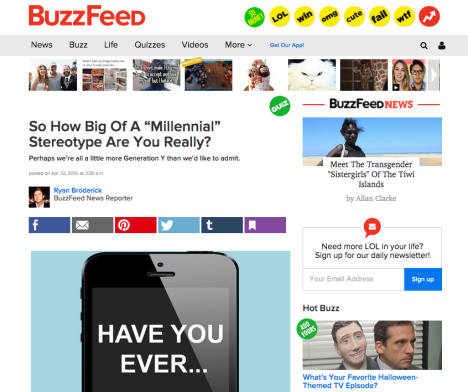The millennial stereotype: tackling generation generalisation
 The communications industry is very fond of generalisations especially when it comes to particular generation/demographic but Ben Thomas argues its time to revise some of the perceptions, particularly the ‘millennial’ stereotype.
The communications industry is very fond of generalisations especially when it comes to particular generation/demographic but Ben Thomas argues its time to revise some of the perceptions, particularly the ‘millennial’ stereotype.
It’s 3:30 in the office at any media agency; that time of day when the consumption of chocolate increases dramatically, as do vacant stares, and the number of screens showing obscure Buzzfeed quizzes.
Today’s quiz of choice – ‘How Big of a Millennial Stereotype are you?’
 Working through the checklist of ‘Millennial’ stereotypes, I quickly began to realise that there were more unchecked than checked statements; I scored a pretty pathetic 57 out of a possible 145.
Working through the checklist of ‘Millennial’ stereotypes, I quickly began to realise that there were more unchecked than checked statements; I scored a pretty pathetic 57 out of a possible 145.


i find this paragraph very interesting:
“Today, as ‘connected everything’ creates an exponential number of online communities, these barriers have been removed, making it possible for anyone, of any age, to connect with like-minded people”
this is absolutely true and it has enormous drawbacks. operative phrase being “like-minded.” milennials congragate in online echo chambers where everybody agrees with each other and have similar perspectives on the world. as such, they have no idea how to respectfully disagree, no idea how to argue a case and thinly veiled contempt for people outside of their community/worldview. gen x-ers and boomers, although they are old and wise enough to understand that not everybody you meet is going to agree with you and that’s OK, are slowly being draw into these gated communities where dissent is seen as rude and those who disagree are evicted. the upvote/downvote system of community management has a lot to answer for here. i see it all the time on forums, social media sites, gaming hubs, news media, anywhere that people meet on line.
millenial arguments tend to go something like this: “it’s 2015 and people are still doing X” or “how is Y even a thing?” they feel justified in their certainty by the constant wave of validation & agreement from their chosen, like-minded communities.
as for how this relates to marketing, i don’t know, but it is certainly an accelerating trend i have picked up on.
Some excellent points! All generalizations are superficial, so it’s always important to look deeper to understand the source of the influence, trend, mindset, etc. That applies to any generation – millennials or boomers. Then a real connection can be made!
This article reads much better with this Chrome plug-in:
https://chrome.google.com/webstore/detail/millennials-to-snake-peop/jhkibealmjkbkafogihpeidfcgnigmlf
@1299, spot on. To ape a popular millennial phrase, they exist in a constant state of ‘circlejerking’
@MOG: Some interesting points, but surely saying all millennials have “no idea how to respectfully disagree, no idea how to argue a case and thinly veiled contempt for people outside of their community/worldview” is adding fuel to exactly the kind of stereotypes Ben is referring to.
Also, I think the apparent ‘contempt’ Millennials could also just as easily be attributed to the folly of youth. GEn X-ers and Boomers all thought they knew better than the generation before them – it’s a rite of passage.
The sooner we give up on the ‘us vs. them’ argument, the better off we’ll all be. I think that’s what Ben is trying to say – age is no longer your defining characteristic, so let’s ditch the demos.
It’s actually ‘on fleek’ not ‘on point’.
SMH.
what does a Strategy Manager actually do?
Great read Ben, top stuff!
“Been unemployed for a length of time”
? The unemployment rate for millenials is the lowest in generations.
Fun fact: many older ‘millennials’ don’t know that they may in fact be classified among their favourite audience segment/punching bag. And besides, weren’t we all ‘Gen Y’ just a few years back?
Great article. Terrible term. Excuse me while I something something avocado toast and don’t ever buy a house.